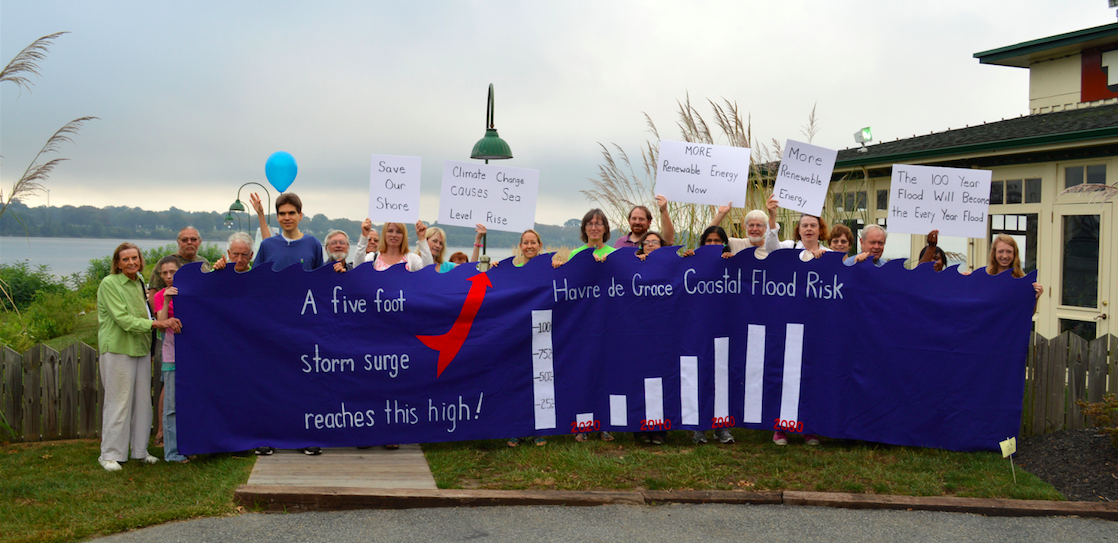This fall CCAN activists and allies advocated for climate change in their communities and in congregations across the state. From over 85 congregations raising up climate justice from the pulpit, to creative community action highlighting the dangers of sea level rise, to our six-stop “Clean Energy Roadshow” sweeping Maryland this fall, we’re engaging hundreds of new people in our movement to strengthen Maryland’s most important climate policies.
After we renew Maryland’s landmark Greenhouse Gas Reduction Act, our top legislative priority in 2016 will be expanding Maryland’s clean electricity standard. This is the number one way we can drive investment into new solar and wind power, moving our state away from fossil fuels, cleaning up our air, and creating thousands of new jobs in the process. Thanks to all of our volunteers and allies, we’re building great momentum behind this campaign this fall!
Sign up for our upcoming roadshow events in Harford County, Howard County or Baltimore City to get involved.

On the weekend of September 27th over 87 congregations participated in a joint initiative between the Chesapeake Climate Action Network and Interfaith Power & Light. Faith communities lifted up climate change and creation care following the Pope’s visit to our region. Congregations held workshops, hosted local climate activists and dedicated their services to addressing climate change. Maryland State Delegate Dereck Davis spoke at Forestville New Baptist Church and quoted Pope Francis. He stated, “Climate change is real, humans are contributing it … it disproportionately impacts the poor and most importantly people must persuade their elected officials to lead the way.” He then added, “It is imperative that Maryland act on climate change so that we can create real sustainable prosperity and to protect future generations and I will honor that promise.” We were happy to have Delegate Davis along with thousands of parishioners across Maryland advocating for Maryland’s two top environmental legislative priorities — expanding Maryland’s clean energy standard and renewing Maryland’s Climate Action Plan.
Harford County Climate Action Commemorates Hurricane Isabel
On October 19th, Harford County Climate Action marked the one-year anniversary of the People’s Climate March and the 12th anniversary of Hurricane Isabel by bringing community awareness to the dangers of sea level rise driven by climate change.
Harford County residents gathered in Havre de Grace at the Tidewater Grill. Climate activists carried a 25-foot blue banner to demonstrate the effect that sea level rise caused by climate change would impact their community.
Tracey Waite, President of Harford County Climate Action warned about the impacts of inaction and retold the story of the devastating damage that Hurricane Isabel wrought on the Havre de Grace community — destroying their boardwalk and damaging many of the city’s streets. Waite addressed the crowd stating, “Global warming has caused sea levels to rise just over one foot since the beginning of the industrial revolution, when carbon-based fuels like coal, oil, and natural gas became the primary source of power. We are supposed to see another foot of sea level rise by 2045. … If we do nothing, we are on track for approximately another four feet of sea level rise by the end of the century. If we do nothing about greenhouse gas emissions, if we go about ‘business as usual, the data indicates that we can expect an increasing risk of very high storm surges. The hundred year flood will become the every year flood.”
CCAN activists and allies like Harford County Climate Action are working to mitigate the impacts of climate change and turn the tide on sea level rise by transitioning away from dirty fossil fuels. By working to enact policies like a 25% clean energy standard, we can protect businesses like the Tidewater grill which are only 2 feet above sea level and communities such as Havre De Grace.
On the Road with CCAN
This fall, CCAN along with the Maryland Climate Coalition, hit the road with our “Energy, Health, and Climate Expos”. The

expos are designed to bring new activists into the climate movement by partnering with green energy businesses, elected officials and environmental advocates. Each expo shows Marylanders across the state how they can act at home, in their communities and in the halls of Annapolis to address climate change.
In Baltimore County, residents joined Delegates Dana Stein, Benjamin Brooks, Shelly Hettleman, Adrienne Jones, Steve Lafferty and Dan Morhaim to discuss policies such as renewing the Greenhouse Gas Reduction Act – a landmark law that would reduce greenhouse gas emissions by 25% by 2020 – as well as increasing Maryland’s clean energy standard. Residents enjoyed vegan soul food and visited with green businesses. Young climate activists had an opportunity to learn more about the different kinds of energy and their impact with the fun, interactive Energy Arcades program from Climate Change Maryland.
In Southern Maryland, residents learned about why there is such a great need to transition away from dirty fossil fuels, as they heard Cindy Peil speak about the Cove Point gas export facility under construction in Lusby and the dangers of fracked gas. Senator Middleton pledged to support a 25% by 2020 clean energy standard and to work to ensure that minorities and underserved communities benefit from clean energy legislation through workforce development and training programs. Residents also heard how they can act in Charles County from Commissioner Ken Robinson — who installed the first residential wind turbine on his property and helped to fight the expansion of the Morgantown coal-powered generating station. Residents had the opportunity to visit with local solar companies such as Solar Tech and learn how to make their homes more energy efficient with local businesses such as Complete Home Solutions.
At the Prince George’s County expo over 100 residents were able to hear about grants and opportunities available to them to make their homes more energy efficient. Residents also heard from their local and state elected officials about the progress that Prince George’s County is making on climate change. From inspiring speakers such as Adam Ortiz from the PG Dept. of Environment who spoke on local initiatives to make clean energy and environmental measures affordable for residents. He also spoke about how Prince George’s is leading the state in waste diversion from landfills, and about the need to fight polluting sources of energy being concentrated in certain neighborhoods. Delegate Davis again pledged his support for increasing Maryland’s clean energy standard and spoke about how dirty energy impacts Prince George’s county’s most vulnerable residents. Expo attendees also were able to interact with local advocacy groups such as Greenbelt Climate Action Network, University Park Solar as well as local green businesses and agencies.
Join Delegate Lisanti in Harford County on November 12th at the Edgewood Boys and Girls Club. Hear from our own Mike Tidwell and Delegate Lam in Howard County on November 17th in Columbia. Learn about how our clean energy policies will take shape in the coming year at the Baltimore City Roadshow being held on November 21st! Sign up for a roadshow near you today!
Bomb Trains: Baltimore’s Next Big Fight
I was taking the short drive in Baltimore from Locust Point to Fort McHenry after meeting with a CCAN activist at a local coffee shop. “It’s worth taking 5 minutes to breath in the history of this part of the city,” she said. “It’s where the Star Spangled Banner was written, it’s where American troops fought off the British to protect the city of Baltimore in the War of 1812.” Crossing the bridge onto Fort McHenry, it’s also where I saw first hand the size and scope of Baltimore’s next big fight: hundreds of DOT-111 (Department of Transportation) trains, or “soda cans on wheels” in the rail yard on Locust Point, potentially carrying explosive North Dakota crude oil or toxic Alberta tar sands.
Transport of Bakken crude oil has been poorly regulated and, subsequently has had an abysmal track record when it comes to safety and environmental destruction. Most crude oil is transported on outdated DOT-111 trains from the fracking fields of North Dakota or the tar sands in Alberta, Canada — crossing cities, rural towns, state parks, watersheds, aquifers, and mountains; all travelling thousands of miles to finally get to refineries. Sometimes, a wheel slips off the track, and that can cause a derailment, which usually punctures the tank. This inevitably causes an oil spill, and easily ignitable Bakken crude oil explodes. When that happens, the resulting explosions look like what nightmares are made of.

Tragically, it was only after a massive explosion in Canada, that killed 47 people and leveled a town, that federal regulators decided to take action to propose rules to make crude oil transport safer. Yet, even after massive amounts of environmental destruction, dangerous DOT-111 trains still carry crude oil throughout our country. “Most of the explosive crude oil on U.S. rails is moving in tanker cars that are almost guaranteed to fail in an accident,” says Earthjustice attorney Patti Goldman, who is currently litigating against the Department of Transportation after failing to ban DOT-111 trains from current use.
Now, oil companies are trying to use Baltimore and the Chesapeake Bay as a throughway to ship Bakken crude and Alberta tar sands to refineries along the East Coast. A Texas based company called Targa Resources is proposing to retrofit an industrial shipping terminal in Curtis Bay to ship over 9 million barrels of oil per year, which equates to over a million gallons of crude oil every day. That means hundreds of DOT-111 “bomb trains” traveling through Baltimore City neighborhoods every year.
Is it worth having these travel through Baltimore? No way. The risks drastically outweigh the meager, if any, benefits, especially with so many unknowns. Currently, there has been no study on safety impacts, environmental health impacts, economic impacts, or train traffic impacts that Targa’s proposed shipping terminal would have on city of Baltimore. Rail companies are even refusing to disclose the routes that crude oil would travel through the city, going so far as suing state regulators to keep this information secret.
But, there is a solution — we can put pressure on the Baltimore city council to halt local permits on Targa’s facility, effectively passing a moratorium on increased crude oil trains through Baltimore, until environmental, safety, economic, and traffic impacts are studied and this information becomes available to the public. The public has a right to know what is traveling through their neighborhoods.

We need to act fast to keep our city safe — and already, we’re gaining real momentum. Since launching our campaign in October, we’ve held two town hall meetings, packed a public hearing, collected hundreds of public comments to the Maryland Department of the Environment, met with City Councilmembers, and petitioned all throughout Baltimore neighborhoods to raise awareness of this dirty and dangerous plan. We’ve even been featured on the front page of the Baltimore Sun!
We don’t need to wait until a tragedy happens in the city of Baltimore for the city council to take action. They can and should take action right now to protect their constituents.
First, sign this petition to your City Councilmember and Mayor Rawlings-Blake here. Then, sign this public comment to the Maryland Department of the Environment. Finally, fill out this volunteer sign up page, and we’ll get in contact. Together, we will be ready to take on Baltimore’s next big fight. No Explosive Oil Trains!


